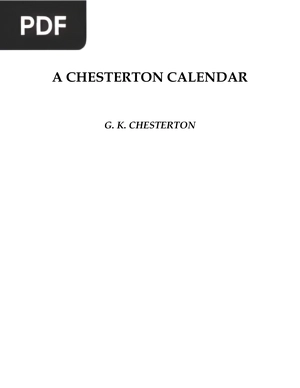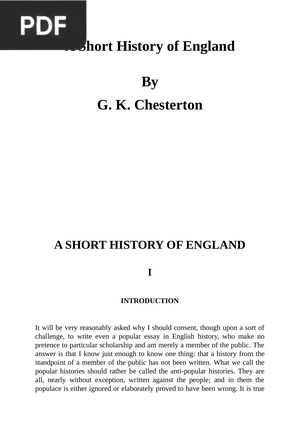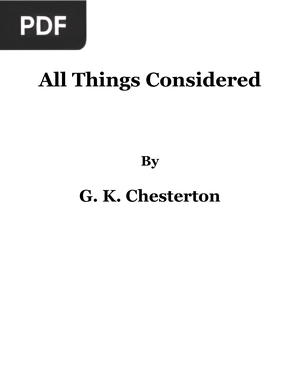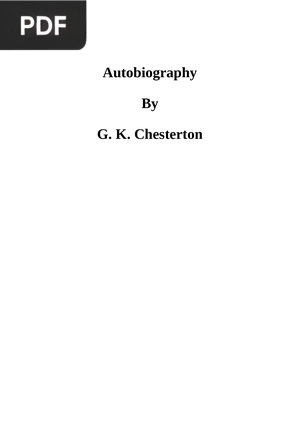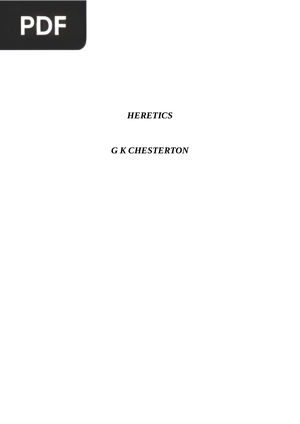George Bernard Shaw
Author: G. K. Chesterton
*Wait a few seconds for the document to load, the time may vary depending on your internet connection. If you prefer, you can download the file by clicking on the link below.
Information
Description: <p>In this book Chesterton describes one of his contemporaries, <strong>George Bernard Shaw</strong>, giving his critical opinion about him and his work, which is an expression of himself. Although this biography does not give many facts about the Irish playwright, it does give us a thorough introduction about him, presenting him in a solid and pleasing picture.</p> <p>As always, Chesterton is insightful in giving us his opinions and criticisms of a different and unusual but very interesting man. He gives him the seriousness he deserves and tries to be more sober than usual. Also this book gives you a good idea of life in those times and does not shy away from criticism when he sees fit.</p> <p>If you want to read a well-written sentence or a well-formulated paradox, you will love this intimate writing by Bernard Shaw.</p>
Pages: 88
Megabytes: 0.45 MB
This may interest you
A Chesterton Calendar
Extension: PDF | 139 pages
<p>In<strong>A Chesterton Calendar</strong>is a collection of short excerpts featuring almost all of G. K. Chesterton's books, as well as some lines from poems; the way it is designed provides a reading for each day of the year.</p> <p>This collection can be seen as a way of getting to know the author's works, in order to then delve into his complete novels. Although for some Chesterton is a writer who requires great concentration and time for analysis, it is worth giving a chance to his works, which in addition to the enjoyment of reading them, can lead to reflection.</p> <p>Among the works included we have: Orthodoxy, Daily News, What's Wrong with the World, Twelve Types, Tremendous Trifles, George Bernard Shaw, All Things Considered, among many others.</p>
A Short History of England
Extension: PDF | 115 pages
<p>Most history books are written to correct other history books.<strong>A Short History of England</strong> is no exception.</p> <p>Concentric by force of eccentricity, ironic by force of conviction, paradoxical by the seemingly extemporaneous, Chesterton wanted to write a popular history -when most accounts of English history were extremely anti-popular- in which the fundamental issue lies not so much in the events themselves as in the importance they would have had.</p> <p>It is a brief and polemical vision of England through its history, in which Chesterton brings out his philias and phobias, as well as his highly original thinking.</p> <p>In the words of Bernard Shaw, the author of this book was "the most concise and at the same time the most complete historian that this neglected country could find".</p>
All Things Considered
Extension: PDF | 112 pages
<p><strong>All Things Considered</strong>is a collection of more than 20 short essays covering various topics -as the title indicates-, among which we can mention: Discussions on human behavior, science, religion, nature, the foundations and basis of society, etc.</p> <p>The writing style presented is quite digestible, and although at times it may seem that the discourse deviates and loses some sense, somehow in the end everything fits together with total coherence. That in addition to providing entertainment and reflection to the reader also leaves in evidence the great wit and insight of the author.</p> <p>Many aspects exposed in these works are still current and relevant today, being an invaluable resource for those interested in 20th century English literature. However, he often makes reference to people or ideas that were well known at the time, but are not now.</p>
Autobiography
Extension: PDF | 211 pages
<p>Chesterton wrote his<strong>Autobiography</strong>shortly before his death at the insistence of his friends and admirers. In it he does not break down his life from birth to the time of his writing, but recounts a series of key moments that he describes as determining the rest of his life.</p> <p>This work is very introspective and focuses little on events. He does not dwell on events such as his marriage or the death of his brother in World War I, for example, but he does detail at length the impact and influence that both events had on his belief system and behavior.</p> <p>Chesterton was known for approaching the subjects of his books from an unexpected point of view and angle, and he apparently approached his life in the same way, so his autobiography may be somewhat unusual if entertaining.</p>
Heretics
Extension: PDF | 93 pages
<p><strong>Heretics</strong> is a collection of 20 essays in which G.K. Chesterton argues about important intellectual figures of his time, expressing his perspective, opinions and philosophy. This work has a timeless character, as his criticisms remain as valid today as they were in his time.</p> <p>It covers topics such as cosmology, anthropology, French nihilism, German humanism, English utilitarianism, the syncretism of social Darwinism and the arrogance and misanthropy of the European intelligentsia. It should be noted that, despite the pejorative title of the book, Chesterton is reserved in expressing his ideas.</p> <p>The personalities in question are related to the world of the arts, literature and politics. Chesterton quotes and reflects on the ideas of: Joseph McCabe; his friend and intellectual rival, Bernard Shaw; as well as Friedrich Nietzsche; H. G. Wells; among other outstanding figures of his time. The author also deeply criticizes personalities of British politics, but without defaming or slandering.</p>


